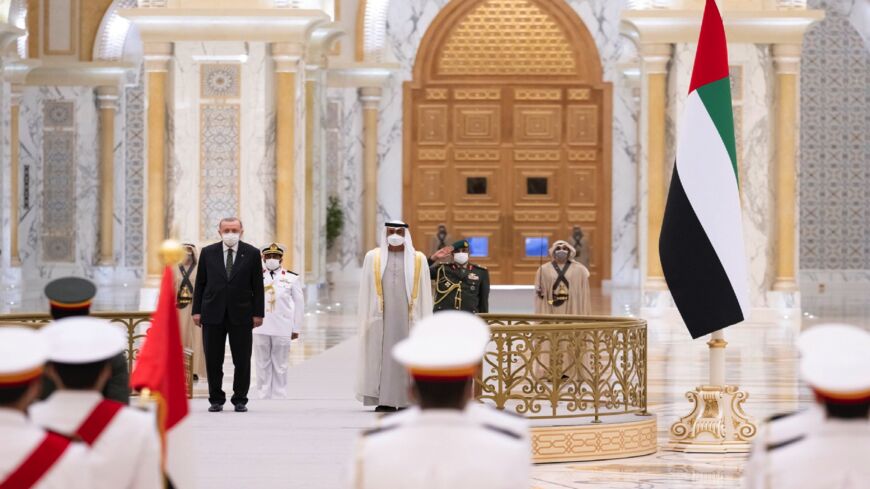« Turkey is reversing policies with Gulf rivals in the hope that local defense companies can return to the lucrative Saudi and Emirati markets » says Burak Ege Bekdil in Defense News.
Deep political divergences harmed Turkish relations with Saudi Arabia and the United Arab Emirates in recent years, including clashing policies over the civil wars in Syria and Libya; the Muslim Brotherhood’s legitimacy in Egypt; support of the military group Hamas in Gaza; the blockade of Qatar; and the normalization of diplomatic relations between Israel and some of its neighbors through the Abraham Accords.
More directly, an official Saudi boycott of Turkish goods brought down trade volume with Turkey to $189 million last year from $3.2 billion in 2019. That boycott ended in January 2022.
Analysts agree that, faced with declining approval ratings, Turkish President Recep Tayyip Erdoğan needs to lure foreign investment and boost mutual trade partnerships to improve the economy ahead of presidential and parliamentary elections in June 2023.
Policy changes
Turkey has changed course several times in its foreign policies:
- On Syria, the Turkish government is leaning further toward its Gulf neighbors in their anti-Iran approach. Tehran’s support of the Damascus regime in the civil war is driving Ankara’s decision.
- In Libya, several foreign parties involved in the civil war withdrew. Geopolitically speaking, it was Turkey against the UAE, Saudi Arabia and Egypt.
- The Egyptian government continues to suppress the Muslim Brotherhood, an organization that has received support in Turkey. But Erdoğan is reversing course and beginning to curb Muslim Brotherhood activity on Turkish soil.
- Turkey has also become less vocal in its ideological support of Hamas. In addition, there are reports that Ankara has banned Hamas-controlled activity in Turkey that would harm Israel.
- The blockade of Qatar — a move that saw Turkish policy clash with those of the UAE, Saudi Arabia and Egypt — ended in 2021.
- Parallel to Turkey’s efforts to reconcile with Gulf states and Egypt, Erdoğan has initiated a charm offensive to improve relations with Israel. He has invited Israeli President Isaac Herzog to Turkey — a de facto end to Turkey’s protest of the Abraham Accords.
Improving relations
In efforts to reconcile, Erdoğan in November hosted Abu Dhabi Crown Prince Mohammed bin Zayed Al Nahyan. In February, Erdoğan visited Abu Dhabi where Turkish and Emirati delegations signed 13 cooperation agreements, including for their defense industries. The president is now gearing up for a fence-mending visit to Saudi Arabia in which he hopes to sign agreements that would lure Gulf investment into cash-strapped Turkey.
“Every country with friendly ties with Turkey is a natural market for Turkish weapons systems,” a Turkish presidential aide said. “Reconciliation with countries [with which] we had difficult relations will mean [a] win-win [for] business, especially in defense industry.”
During Erdoğan’s visit to Abu Dhabi, Emirati officials pledged to invest $10 billion in Turkey’s defense, agriculture, information technology, construction, energy, food, real estate and health industries in the next several years.
The first of the planned UAE investments will come into Turkey’s defense industry,” said Nail Olpak, president of Turkey’s Foreign Economic Relations Board. “We see a particularly great appetite to invest in Turkish defense industry.”
Two-way trade between Turkey and the UAE was worth $8 billion in 2021. Olpak estimates annual trade will grow by 40 percent in the years ahead.
“There is great potential [in defense industry],” said Anil Şahin, a Turkish defense analyst. “Of course, a prerequisite to happier days is sustainable normalization in political relations.”
An official with a defense exports portfolio told Defense News that cooperation between Turkey and Gulf clients could include both armed and unarmed air-, sea- and ground-based drones; missile systems; naval platforms; helicopters; remotely controlled gun stations; air defense systems; and armored vehicles. The official spoke on the condition of anonymity because the individual was not authorized to speak to the media.
Last year, Al Jasoor — a joint venture between Emirati defense conglomerate Edge Group and Turkish firm Otokar — launched their six-wheel drive amphibious armored vehicle Rabdan, a variant of the eight-wheel drive infantry fighting vehicle with the same name that entered service with Emirati forces in April 2021.
But Gulf states won’t want to rush into things, an Arab diplomat in Ankara told Defense News.
“The Gulf states have reason not to [make] haste, to make irreversible decisions to invest in Turkey,” the diplomat said, speaking on condition of anonymity because the individual was not authorized to speak to the media. “They will want to make sure Erdoğan does not change course once again.”
Defense News, March 1, 2022, Burak Ege Bekdil

